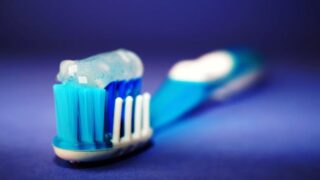
More Dental Health Articles
Do Tongue Scrapers Really Improve Oral Health?

When it comes to maintaining pristine oral hygiene, many people wonder: do tongue scrapers work? Tongue scraping is a practice that involves using a specially-designed tool to remove bacteria, food debris, and dead cells from the surface of the tongue. While brushing and flossing are commonly associated with oral care, tongue scraping might be the missing piece in a comprehensive oral hygiene routine.
Do Tongue Scrapers Work?
For those curious about whether tongue scrapers work, the answer lies in their ability to improve oral health by reducing bacteria and improving breath. The tongue harbors a variety of bacteria, which can contribute to bad breath and plaque buildup if not addressed. By using a tongue scraper, you may be able to reduce these factors significantly, potentially leaving your mouth feeling cleaner and fresher.
Benefits of Using a Tongue Scraper
There are several benefits to incorporating a tongue scraper into your daily oral care regimen. These include:
- Reduced Halitosis: One of the most notable benefits of tongue scraping is its potential to reduce bad breath. By removing the bacteria that produce odors, a tongue scraper can be a simple tool for fresher breath.
- Improved Taste Sensation: Some studies suggest that regular use of a tongue scraper can enhance taste sensation by clearing away debris and bacteria that block taste buds.
- Better Oral Hygiene: By reducing bacteria in the mouth, tongue scraping may help reduce the risk of developing cavities and gum disease, although it should complement, not replace, brushing and flossing.
How to Use a Tongue Scraper
To make the most of a tongue scraper, use it daily as part of your oral hygiene routine:
- Start by rinsing the tongue scraper with warm water.
- Stick out your tongue and place the scraper at the back of the tongue.
- Using gentle pressure, pull the scraper forward along the tongue surface. Rinse the scraper after each pass.
- Repeat the process several times, covering the entire surface of the tongue.
- After use, cleanse the tongue scraper thoroughly and store it in a clean area.
Choosing the Right Tongue Scraper
Tongue scrapers come in various materials, including plastic, metal, and silicone. Metal scrapers tend to be more durable and efficient, while plastic ones may be easier for beginners to use. Consider your comfort and any specific needs when selecting a tongue scraper.
Tongue Scraping vs. Other Methods
While brushing the tongue with a toothbrush can be effective in reducing some bacteria, it often doesn’t remove debris as effectively as a tongue scraper. Tongue scrapers are specifically designed to reach the crevices of the tongue and provide a more thorough clean. However, it’s important to note that tongue scraping should not replace regular brushing and flossing.
Integrating Tongue Scraping into Oral Health Habits
Integrating tongue scraping into your routine alongside brushing and flossing can improve overall oral hygiene. A comprehensive oral care plan can also include regular dental check-ups and professional cleanings. For more detailed guidance on healthy habits, consider exploring safe and effective health approaches.
What Do Studies Say?
Scientific studies on the effectiveness of tongue scrapers show promising results. For example, research has demonstrated that tongue scraping can significantly reduce the coating on the tongue that contributes to bad breath. More research is doing to further understand the benefits and limitations of tongue scraping, but early findings are encouraging.
Additional Resources on Oral Health
For further information on oral hygiene best practices, visit this informative guide by Wikipedia that offers a broad overview of maintaining good health.
Do Tongue Scrapers Work in the Long Term?
By consistently incorporating tongue scraping into your oral hygiene routine, you may see long-term benefits in terms of breath freshness and overall mouth cleanliness. Remember, while tongue scrapers can be beneficial, they should be part of a holistic approach to oral care, involving regular brushing, flossing, and dental visits.
- Tongue scraping can help reduce bad breath and improve oral hygiene.
- Regular removal of bacteria and debris may enhance taste sensation.
- Use a tongue scraper correctly as part of a daily routine for best results.
- Choosing the right scraper material is important for effectiveness and comfort.
FAQ
How often should I use a tongue scraper?
For optimal results, it’s generally recommended to use a tongue scraper once a day as part of your morning or evening oral hygiene routine.
Can anyone use a tongue scraper?
Most people can use a tongue scraper without issues, but if you have a sensitive tongue or existing oral conditions, consult your dentist before starting a new oral care tool.
Are there any side effects to tongue scraping?
When used correctly, tongue scrapers are generally safe. Applying too much pressure can cause irritation or minor damage, so it’s crucial to use gentle strokes.
Do tongue scrapers help with dental plaque?
While tongue scrapers primarily target bacteria and food debris on the tongue, they can complement other oral hygiene practices to help improve overall oral health and prevent plaque buildup.
Is brushing the tongue as effective as using a tongue scraper?
Brushing the tongue can help reduce some bacteria, but tongue scrapers are often more effective due to their design, which allows for a more thorough cleaning of the tongue’s surface.
Other Articles You May Find of Interest...
- Why Does the Side of My Tongue Hurt and What You Can Do About It?
- Gentle Relief: Discover the Best Mouthwash for Sensitive Teeth
- New Year, New Smile
- Benefits of Holistic Dental Care in Springfield Missouri
- Dental Solutions for Mild to Moderate Sleep Apnea
- How to Choose the Right Orthodontist in Chicago
- Choosing the Best Toothpaste to Combat Gum Disease Effectively














